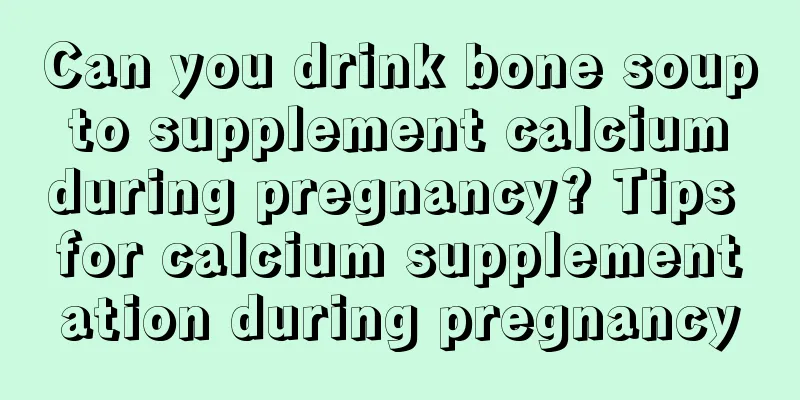Can you drink bone soup to supplement calcium during pregnancy? Tips for calcium supplementation during pregnancy

|
Many new pregnant mothers will choose to drink bone soup to supplement calcium. So is it reliable to say that bone soup can supplement calcium? Can it really play a role in supplementing calcium? Are there any other foods and methods to supplement calcium? What should we pay attention to in our lives if we want to supplement calcium? Let's take a look with the editor below. Does bone soup supplement calcium during pregnancy?The answer is NO. 1. Calcium is a water-insoluble mineral. Even if a large amount of vinegar is added during the cooking process to dissolve the calcium, the calcium content in bone soup is almost negligible, and the bone soup will be so sour that it is difficult to eat. In general, no matter what means are used to cook bone soup, the calcium content in bone soup is far from reaching the purpose of calcium supplementation, and it is only better than nothing. 2. It is worth mentioning that the calcium content in bone soup is pitifully low. The calcium content in 10 kg of pork ribs boiled into pork bone soup is less than 150 mg. Someone once tested that a bowl of bone soup contains about 2 to 3 mg of calcium. Based on the daily calcium requirement of 800 mg for an adult, it is estimated that 300 to 400 bowls of bone soup are needed to meet the calcium needs of the human body. 3. "The snow-white thick soup base is rich in nutrients" is mostly a promotional means of merchants. The actual calcium content of bone soup is not rich. Moreover, during the long stewing process, the fat in the bones is completely stewed out and dissolved into the soup, causing the fat content in the bone soup to rise sharply. Drinking a lot of bone soup not only fails to achieve the effect of calcium supplementation, but may lead to excessive energy intake. Drinking too much is not good for your health. Which foods are high in calcium?Hard cheese: Calcium content in 100 grams (mg) 731 Low-fat cheese: Calcium content in 100 grams (mg) 622 Skim sweetened condensed milk: Calcium content in 100 grams (mg) 330 Yogurt (flavored): Calcium content in 100 grams (mg) 160 Yogurt (fruit pieces): Calcium content in 100 grams (mg) 61 Pigeon: Calcium content in 100 grams (mg) 866 Chicken: Calcium content in 100g (mg) 111 Bacon: Calcium content in 100 grams (mg) 293 Hairtail (cut into segments): Calcium content in 100 grams (mg) 431 Grass carp (smoked): Calcium content in 100 grams (mg) 448 Windtail fish (cooked): calcium content in 100 grams (mg) 665 Shrimp paste: Calcium content in 100 grams (mg) 308 Brown eggs: Calcium content in 100 grams (mg) 44 Boiled eggs: Calcium content in 100 grams (mg) 35 Tofu skin: Calcium content in 100 grams (mg) 239 Dried tofu: Calcium content in 100 grams (mg) 352 Southern tofu: Calcium content in 100 grams (mg) 113 Northern tofu: Calcium content in 100 grams (mg) 105 Sunflower seeds (cooked): Calcium content in 100 grams (mg) 112 Pistachios (cooked): Calcium content in 100 grams (mg) 108 Peanuts: Calcium content in 100 grams (mg) 79 Jujube (dry): Calcium content in 100 grams (mg) 62 Calcium supplementation should pay attention toPregnant women should pay attention to "4 acids and 1 sodium" when supplementing calcium 1. Oxalic acid The oxalic acid in spinach, bamboo shoots, amaranth and other vegetables we often eat will combine with calcium to form calcium oxalate, which is not easily absorbed. Oxalic acid can combine with calcium in the intestine to form insoluble precipitation, affecting calcium absorption. If pregnant mothers want to eat these vegetables, they can blanch them in boiling water before cooking to remove the astringency. 2. Sodium If expectant mothers consume too much salt during pregnancy, it will affect the body's absorption of calcium. Therefore, it is better for expectant mothers to have a light diet. 3. Phytic Acid Rice and white flour contain phytic acid, which will combine with calcium in the body to form phytic acid calcium magnesium salt. It is not difficult to remove these phytic acids. Soaking rice in warm water can decompose most of the phytic acid in rice. After the flour is fermented, the phytic acid in it will also be decomposed. 4. Phosphoric acid The large amount of phosphoric acid contained in the carbonated drinks we often drink, including coffee, hamburgers, pizza, French fries and other foods, will squeeze calcium out of the body. 5. Fatty acids Fatty foods will reduce the absorption rate of calcium. Pregnant mothers should eat less fatty foods. 6. Low intake of vitamin D Professor Liu Haitang said that although pregnant women pay attention to the calcium intake from food every day, the supplement of vitamin D may not keep up. In addition, many pregnant women rarely get sun exposure to prevent sun spots. Therefore, it is not ruled out that the lack of vitamin D affects the absorption and utilization of calcium, and finally leads to calcium deficiency. The sun's ultraviolet rays can also help synthesize vitamin D. Therefore, it is recommended that expectant mothers only need to spend more than half an hour outdoors in the sun every day to synthesize enough vitamin D. Calcium supplementation is not the more the betterCalcium supplementation is not the more the better, and it should be done scientifically. Excessive calcium supplementation during pregnancy will cause calcium to precipitate in the wall of the placenta blood vessels, causing the placenta to age and calcify, reducing the secretion of amniotic fluid and making the fetus's head too hard. In this way, the baby cannot get enough nutrition and oxygen provided by the mother, and a too hard head will also prolong the labor process, threatening the baby's health. |
<<: How to relieve the causes of edema in pregnant women
>>: Who can't eat bacon? Who can't eat bacon?
Recommend
What should I do if my baby has skin allergies in spring? What medicine should my baby take for skin allergies?
Spring is here, and people are starting to wear l...
Does obesity affect pregnancy? What are the effects of obesity on pregnancy?
As life improves, many women are facing the probl...
How long does it take for the lochia to be clear after a normal birth?
Lochia is a hurdle that women must overcome after...
Can Chinese toon help pregnancy? Does Chinese toon have the effect of helping pregnancy?
For men and women who are preparing for pregnancy...
What causes children to be thin? What should children be checked for?
We all know that children are usually thin, but i...
What should be checked during pregnancy preparation?
There is always a process from a little girl to a...
Should you squeeze the nipple of a newborn baby?
The whole family is very happy when the baby is b...
Can floral water be sprayed directly on the body? What should be paid attention to when using floral water in summer?
In summer, you can often see people using toilet ...
How to distinguish whether a child has ADHD or is naughty? Can ADHD in young children be cured by itself?
When children reach a certain age, they always se...
Symptoms of ADHD in children. What should I do if my child is hyperactive?
It is a sign of health for a child to be lively a...
What are double rows of teeth? The harm of double rows of teeth
As the name suggests, double rows of teeth are tw...
How to diagnose bronchitis in children? Do children with bronchitis need to be hospitalized?
After the baby is born, the body's immunity i...
How to treat postpartum disease How to treat postpartum disease
It is a Chinese tradition that pregnant women sho...
Nursing measures for acute mastitis How to treat acute mastitis
Many mothers suffer from mastitis due to improper...
Why is painless childbirth not recommended? Does painless childbirth have any sequelae?
The topic of painless childbirth has recently aro...









